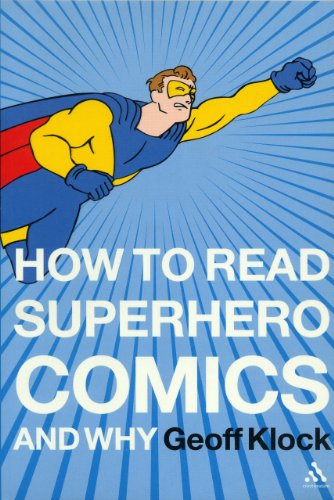Artículos relacionados a How to Read Superhero Comics and Why

Críticas:
A few critical texts have focused on specific comic creators or characters. In a field with so little broken ground, most such studies can be fairly called groundbreaking. Klock s approach is innovative. Science Fiction Studies, 2004 Within the underdeveloped world of comics criticism, where heroic but often uncritical enthusiasm continues to battle the arch-villain of theoretical interpretation, Klock s approach is innovative, as my concluding discussion will show Klock provides an intriguing way to read texts that are still dismissed as semi-literate fantasies for adolescent boys. Science Fiction Studies, 2004 "Klock's strength lies in his commitment to looking at comics in a novel way, through the lens of literary analysis. He melds his encyclopedic knowledge of the superhero genre with the language of literary theory so as to join seemingly disparate worlds and to better inform the reader how comic book narratives have built upon and referenced one another throughout the history of their development." -Children's Literature Association Quarterly "Exceptional"--Today's Books "A book like this is way overdue. I m just glad someone finally had the balls to write it." Joe Casey, writer of Wildcats and Automatic Kafk "Exceptional" Today's Books ."..a fascinating exegesis of superhero comics, outlining how the main movement of the genre since its inception has been toward self-cannibalization, which some have chosen to call metafiction...he does a pretty good job explaining why they are what they are and why they're never likely to really ascend to anything else. An entertaining read...it's nice for a change to see comics taken seriously as subjects of literary criticism. We could use more of it." Comicbookresources.com "The strengths of the book are the many [...] connections made to literary and psychoanalytical figures, the attempt to explain the metamorphosis of a new type of superhero comic, and a close reading of the comic books used to support the book's thesis. The book does add new dimensions to the much-overworked subject of superhero comic books." Choice, May 2002 & May 2003 "Even readers who cannot accept self-consciousness and 'power' as the defining features of 'the literary' will benefit from Klock's demonstration that superhero comics reward such a reading .Klock depends (as he acknowledges) both on well-known academic theorists and on the enormous body of nonacademic criticism by fans (some of it increasingly on the Web). His focus on how comics depict their own history may seem partial, or excessive. As Douglas Wolk has also noted, contemporary mainstream comics, with their shared 'universes' and overlapping plots, posit a 'superreader' who has been purchasing many titles for years; Klock's 'macro-reading' assumes such readers as well (his detailed bibliography may help create more of them)." Stephen Burt, College Literature, January 2005 issue
Reseña del editor:
Superhero comic books are traditionally thought to have two distinct periods, two major waves of creativity: the Golden Age and the Silver Age. In simple terms, the Golden Age was the birth of the superhero proper out of the pulp novel characters of the early 1930s, and was primarily associated with the DC Comics Group. Superman, Batman, Green Lantern, and Wonder Woman are the most famous creations of this period. In the early 1960s, Marvel Comics launched a completely new line of heroes, the primary figures of the Silver Age: the Fantastic Four, Spider-Man, the Incredible Hulk, the X-Men, the Avengers, Iron Man, and Daredevil. In this book, Geoff Klock presents a study of the Third Movement of superhero comic books. He avoids, at all costs, the temptation to refer to this movement as "Postmodern," "Deconstructionist," or something equally tedious. Analyzing the works of Frank Miller, Alan Moore, Warren Ellis, and Grant Morrison among others, and taking his cue from Harold Bloom, Klock unearths the birth of self-consciousness in the superhero narrative and guides us through an intricate world of traditions, influences, nostalgia and innovations - a world where comic books do indeed become literature.
"Sobre este título" puede pertenecer a otra edición de este libro.
- EditorialContinuum International Publishing Group Ltd.
- Año de publicación2002
- ISBN 10 0826414184
- ISBN 13 9780826414182
- EncuadernaciónTapa dura
- Número de páginas256
- Valoración
EUR 10,22
Gastos de envío:
EUR 6,36
De Reino Unido a Estados Unidos de America
Los mejores resultados en AbeBooks
How to Read Superhero Comics and Why
Publicado por
Continuum Intl Pub Group
(2002)
ISBN 10: 0826414184
ISBN 13: 9780826414182
Antiguo o usado
Tapa dura
Cantidad disponible: 1
Librería:
Valoración
Descripción Condición: Very Good. 1707837920. 2/13/2024 3:25:20 PM. Nº de ref. del artículo: U9780826414182
Comprar usado
EUR 10,22
Convertir moneda
Gastos de envío:
EUR 6,36
De Reino Unido a Estados Unidos de America
Destinos, gastos y plazos de envío

